Meet Ula – a Bright Culture Creator
Ula is the first non-developer who joined the Bright team over 5 years ago. Now, she is more than a crucial employee. She is our Bright mom (seriously). 😉 She takes care of the recruitment area, employees' well-being and our brand development. No matter what, you can always talk to Ula. And she will find time for you, despite the fact that she is one of the busiest people in the company. 😉 Meet Ula – HR and Marketing Manager at Bright Inventions.
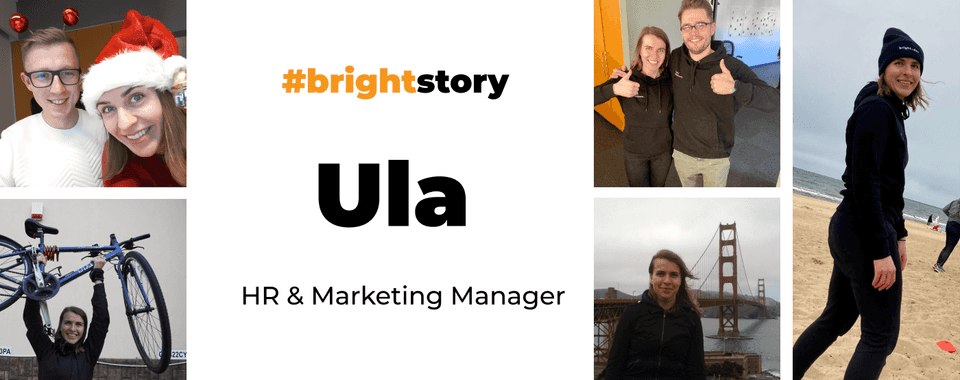
You studied English Philology to eventually got into Marketing and HR. What did this journey look like?
It was a really cool journey. I liked my studies a lot. In fact, I liked all of them. I started with translation studies at English Philology here in Gdańsk. I loved English and I had a few really great English teachers in the past who instilled love for this language in me. But when I was choosing my studies I was also thinking about psychology and marketing. The fun fact is that my maths teacher in the secondary school was encouraging me to take up some engineering studies then. And I liked maths a lot. Generally it was not an easy choice. 🙂
Anyway, during studies and after them I was translating texts from many different industries and I loved this diversity, but at the same time I was into marketing a lot.
After my first MA I started an internship at a PR agency and at the same time I also decided to begin my second MA studies – marketing ones. I really like the feeling that I know the ins and outs of the field I work in. I remember I did many great practical projects during my studies. There were interesting subjects like creating brand strategies, company’s missions, preparing business plans, merchandising models etc. Dozens of creative things. I just love the process of creation. After I graduated I started my job at Twitter. At that time I also discovered that what I really needed was one brand and people around it.
How do you recall working closely with such a big organization as Twitter?
I recall that as a great experience and a good lesson. I think it was a very important part of my professional development. I learned that there are different ways of managing people, micro-management ones and those based on freedom and responsibility that let you grow.
I was working with dozens of brands from different industries like Wirtualna Polska, Wedel, ING, Lays, but also companies like DocPlanner or Booksy which were small startups back then. It was a great experience to discover different marketing strategies and work with different business needs. And for sure the adventure was also visiting California and meeting the team working there including Adam Bein or Jack Dorsey.
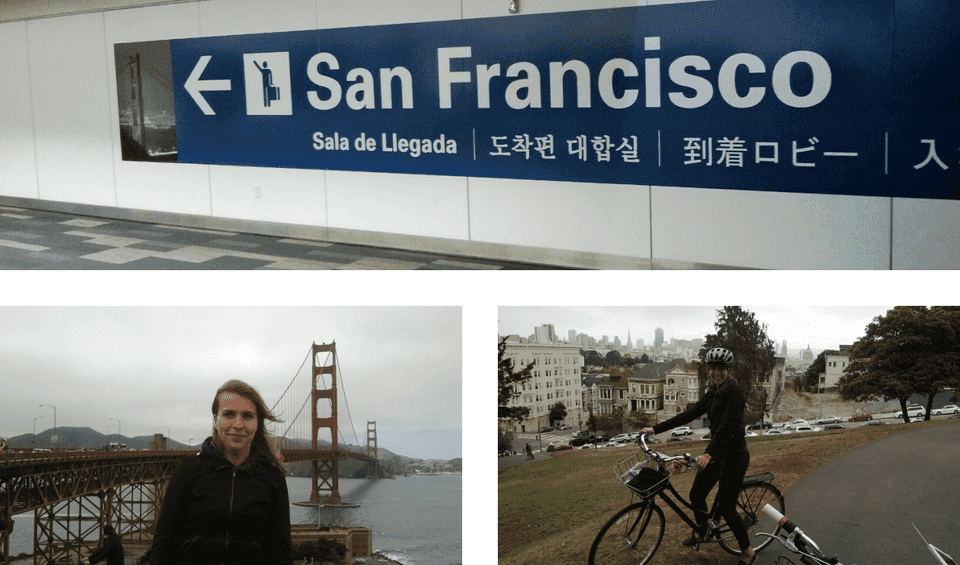
And disadvantages? I think that the feeling that you sometimes may put your whole heart into work, but you do not have an influence on the final decision of your clients or the organisation itself.
Eventually, you joined Bright Inventions where you manage our HR and Marketing activities. What gives you the most satisfaction at your job?
Yes, I started my employer branding and recruitment adventure at Bright Inventions in 2016 (Read this blog post to know more about Ula’s beginnings at Bright). The surprising fact may be that employer branding was not so easily recognisable at that time. But I knew that for me it was a great opportunity to connect my love for people, psychology and marketing.
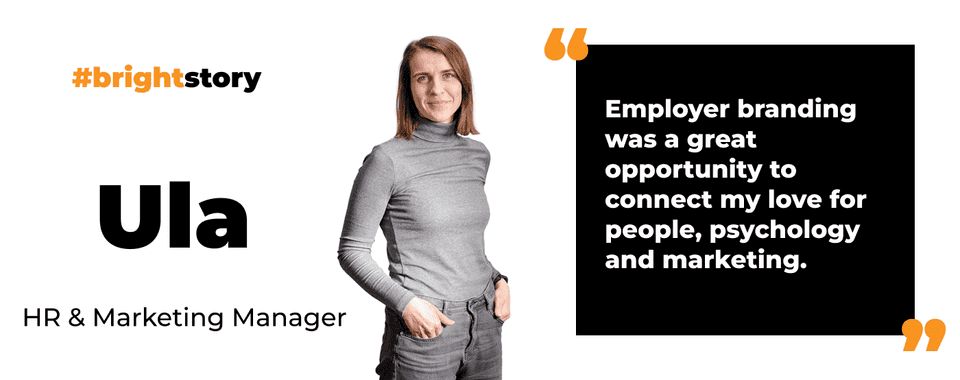
Bright Inventions was a beautiful blank page where I could put my all ideas into actions and use my creativity.There was almost nothing considering HR and marketing procedures when I joined. But there were great people. When I joined there were eight people on board. And I really appreciate the trust and independence I was given.
What gives me satisfaction is the feeling that I create something of great value. I believe in what we create here. I enjoy developing marketing and HR strategies, improving communication, and building the whole recruitment process. Actually, I am all about optimisation. The market is changing, people's needs and expectations are changing. We should adjust all the time. It is a dynamic and constant development.
And I really enjoy the recruitment area. I feel that thanks to my support new people can develop in the organisation or just can find the organisation they have been looking for. I have a chance to build something more than a workplace, for me it is a community in which you can see the growth of people, their experience and expertise. I love my team here at Bright Inventions. I feel responsible for them.
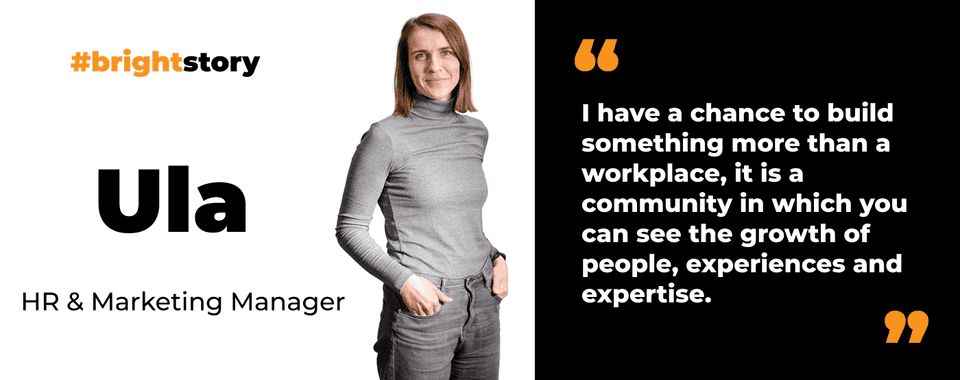
And how do you adjust to these ongoing changes in the market?
I love learning and I think I am not afraid of experimenting and checking new ideas. I like the agile way of thinking. You are working on a solution, implementing it and then checking if it works. If the requirements and expectations change, you are introducing alterations and the whole process continues all the way round.
I get inspiration from experts who have built really great companies, really great brands and above all great, strong teams. Often you do not have to reinvent the wheel, but what you can do is to link all the dots in your life in an interesting, sometimes unexpected way, and it works. It depends on us how we link these dots. But we can create some incredible stuff if we do not limit ourselves and do not follow common popular paths.
What is the most challenging thing about IT recruitment?
Finding a good cultural fit. I think that is the real challenge. There are a lot of talented software developers in the market, but technical skills are not everything. To make the relationship work for both sides, we have to have a similar mindset and see a common goal. Then both the new hire and the current team are happy.
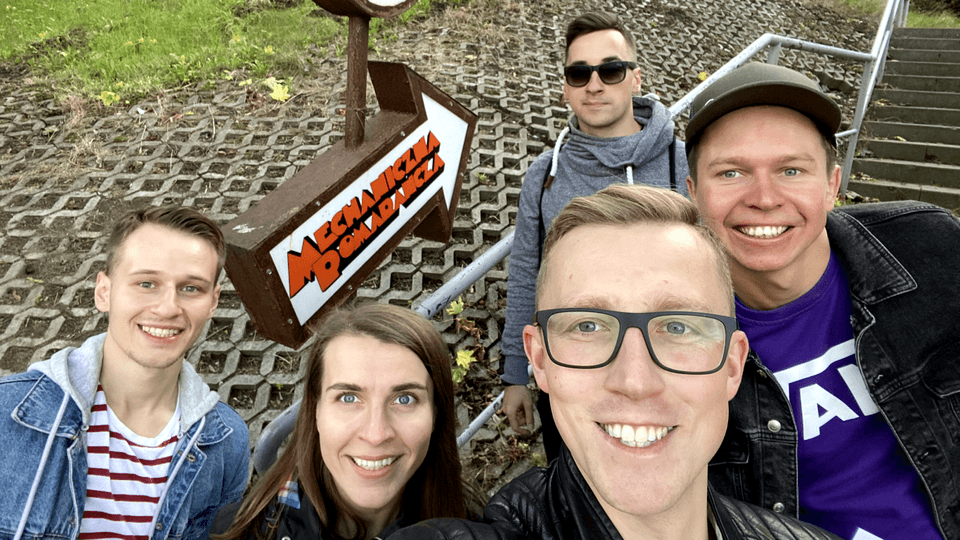
Of course, functional programming knowledge, commercial experience and someone’s expertise are must-haves in particular roles, but at the same time we pay a huge attention to core values and non-technical skills each candidate posseses. We sometimes must reject applicants who have strong technical skills, but there is no cultural fit. We are pretty sure that these people would not cooperate well in our community and they would just not be happy. And the point should always be to create a long lasting satisfactory relationship for both parties engaged in the process, the employer and the employee.
So, what is the recipe for successful onboarding when you have this new hire already on board?
Communication is the key and is also the key in the onboarding process. When there is a new person in our team, we take care of him/her. And by taking care I mean proper planning, engaging buddies, organising follow-ups and check-ins or giving feedback. New hires should not stress about what to do next after joining the team and they also should not stress about how they are doing. A new employee should be provided with all the information, feedback and support they need. The less anxiety and worry in the beginning the better employee's experience we will have in the long-term. Poor onboarding causes a lot of negative consequences, it does not only lower engagement and productivity, but also leads to high employee’s turnover. The real and the worst cost of unplanned and defective onboarding is the loss of an employee in the end.
Read more about Bright Inventions’s onboarding.
I get the feeling that you don’t like when people call you a non-technical person. Is that true?
I have nothing against the word “non-technical”. What I don’t like are stereotypes. The fact that I am not a developer does not mean that I am not interested in software development topics. And it does not mean that I don’t understand them.
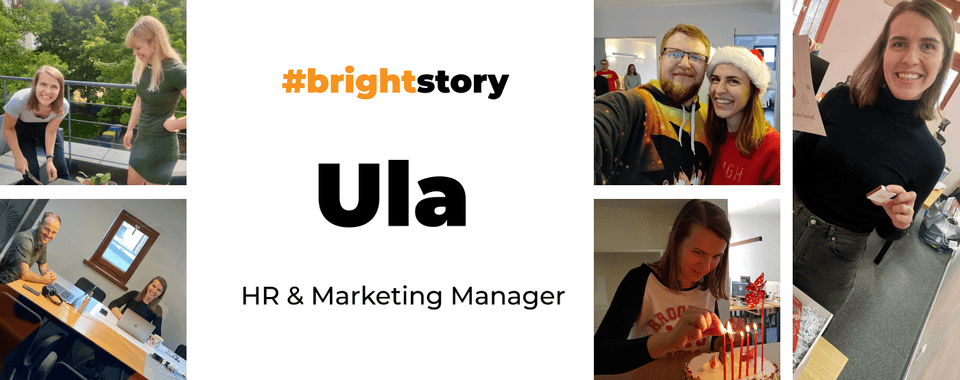
It all comes to HR stereotypes obviously. I constantly see they still exist. Sometimes during interviews candidates are a bit stunned that I follow the technical part or I ask some technical questions myself. I think it should be no surprise to anyone. I am not a developer, I am saying that openly, but could I be a good IT recruiter if I didn’t know the aspects of technologies used by developers or I didn’t understand how the whole software development process looked like? I don’t want to be judgemental, but I think you just should not recruit specialists from IT if you don’t know their sector and mindset well. And it is the same about any field you are recruiting in.
Does it mean that you could become a programmer someday?
My maths teacher would be proud for sure. 😉 As you know at school I always enjoyed mathematics. And I always felt like I came from two worlds: scientific and linguistic. That could be quite a nice combo, don’t you think? Programming and learning TypeScript or any other technology looks to me like learning a new language. Maybe it is my future career. 😀
What does your typical day at work look like? Is there something like a typical day at work?
Meetings and interviews mostly set the rhythm of my day. But I also have some permanent elements like weekly Monday meetings with my team, 1:1s with the girls from the HR & Marketing squad, quarter retrospectives or planning sessions. I plan a lot and I try to manage my time wisely, but there are also days when I have to switch context very quickly. Some issues are hard to predict. You need to be flexible. What is crucial to me is also finding time for deep work when I can focus on my individual tasks. So, to some extent my days are typical, but typical in a non-typical way. 🙂
After hours you teach English teenagers and adults in the local language school. Why? What does it give you?
Satisfaction. It gives me satisfaction that I can share my knowledge with other people and it brings some extra value to their development. I have been working hard to be where I am now and it is a great feeling that I can use my skills in such a way. I like watching my students making progress. I think that language classes also give people great space for interesting interactions and discussions. Sometimes they may even be a kind of therapy. Conversations and speaking exercises create favourable conditions for people to talk about their problems or dilemmas. Being an English teacher is not only about teaching a language, but also about supporting your students in their development and being their friend.
You commute by bike every day. How do you motivate yourself to jump on the bike when it is freezing outside? We live in Poland, weather can be tricky here. 😉
There is no bad weather to ride a bike, only bad clothing or a bad attitude. 😀 I started riding my bike like every day probably 8 years ago. I remember my first winterride. I fell down on the ice at least twice. I could give it up, but instead I decided to improve my riding techniques. It is fun to ride on snow. You have to try it. 🙂
And I love the feeling after the ride. For me it is my healthy routine. It is good for my mood and my body.
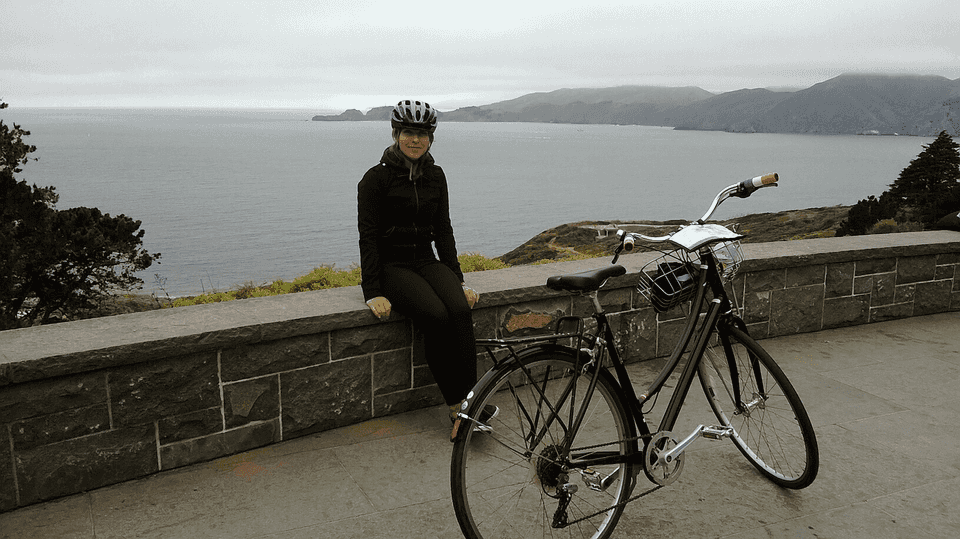
And apart from biking. How do you spend the rest of your spare time?
One may think it would sound sad, even really sad, but I like my job and it happens quite often that after hours I still do things connected with my development. I read psychology, marketing or management books, listen to podcasts or watch some webinars. But I also love nature. I rest best in the forest, in the mountains or at my parent’s who live in the countryside in Suwalszczyzna. I love taking pictures. Still as amateur, but it gives me a lot of fun.
I have also started learning Spanish recently just for myself as I needed something fresh and new. And there are also English classes that I run, so I think I have quite many things to focus on when I am not at Bright. 🙂

